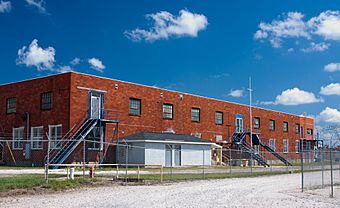Chickasaw Shipyard Village Historic District facts for kids
Quick facts for kids |
|
|
Chickasaw Shipyard Village Historic District
|
|
 |
|
| Location | Bounded by Jefferson St., Jackson St., Yeend Ave., and Chickasaw Creek, Chickasaw, Alabama |
|---|---|
| Area | 1,200 acres (490 ha) |
| Built | 1917-1946 |
| Architect | various |
| Architectural style | various |
| NRHP reference No. | 04000924 |
| Added to NRHP | September 3, 2004 |
The Chickasaw Shipyard Village Historic District is a special area in Chickasaw, Alabama. Chickasaw is a town near Mobile, Alabama. This historic district is important because it was once a "company town." This means a company built and owned the whole town for its workers.
This town was built for the Gulf Shipbuilding Corporation shipyard. It played a big role in the first half of the 1900s.
Chickasaw was also part of an important U.S. Supreme Court case. It was called Marsh v. Alabama in 1946. The court decided that people living in privately owned towns still had their First Amendment rights. This was because these towns acted like public places. The district was added to the National Register of Historic Places on September 3, 2004.
Contents
History of Chickasaw Village
A Town Built for Workers
In the early 1900s, Chickasaw Shipbuilding built the town of Chickasaw. They owned everything in it. It was a place for their workers to live. The town had nice houses for families.
But it wasn't just houses. The town also had many useful places. There was a community center for everyone to use. There was a school for kids and a health clinic. People could buy things at the local stores.
The town also had important services. It had a plant to clean water. It also had a system to treat sewage. One building was first used to make and store ice. Later, it became offices and a hospital.
Some streets in the town had sidewalks. Cars used alleys to get around. There were even fun places like tennis courts and a golf course. When Chickasaw Shipbuilding closed its shipyard, some houses were moved or torn down.
New Owners, New Improvements
In 1940, Gulf Shipbuilding bought the shipyard and the town. They fixed up the houses that were already there. They also made the town even better. They paved some of the streets.
The main shopping area was very popular. It had many buildings connected by a covered sidewalk. This sidewalk was about 250 feet (75 meters) long. You could find a drugstore, a grocery store, and a restaurant there. There was even a post office. By 1943, Gulf Shipbuilding rented out the extra spaces to other businesses.
Many of the original homes are still in Chickasaw today. They are the main part of this historic district. A historian named Gene Ford helped gather information about these buildings. Because of his work, the area was added to the National Register of Historic Places in 2004. The Chickasaw Historic Preservation Society has a tour you can take to see the important spots.
Chickasaw Becomes a City
In early 1946, a company called Leedy Investment Company bought the entire town. They paid one million dollars for it. People who were renting homes in the town could now buy them. Many former residents also bought homes and moved back. Chickasaw officially became its own city on November 12, 1946.
Later, in 1979, another company called Halter Marine started using the shipyard again. They built ships for the growing offshore oil industry. But this didn't last long. The shipyard closed again in 1983. Today, the old shipyard is used as a small place to handle general cargo.
 | Emma Amos |
 | Edward Mitchell Bannister |
 | Larry D. Alexander |
 | Ernie Barnes |



